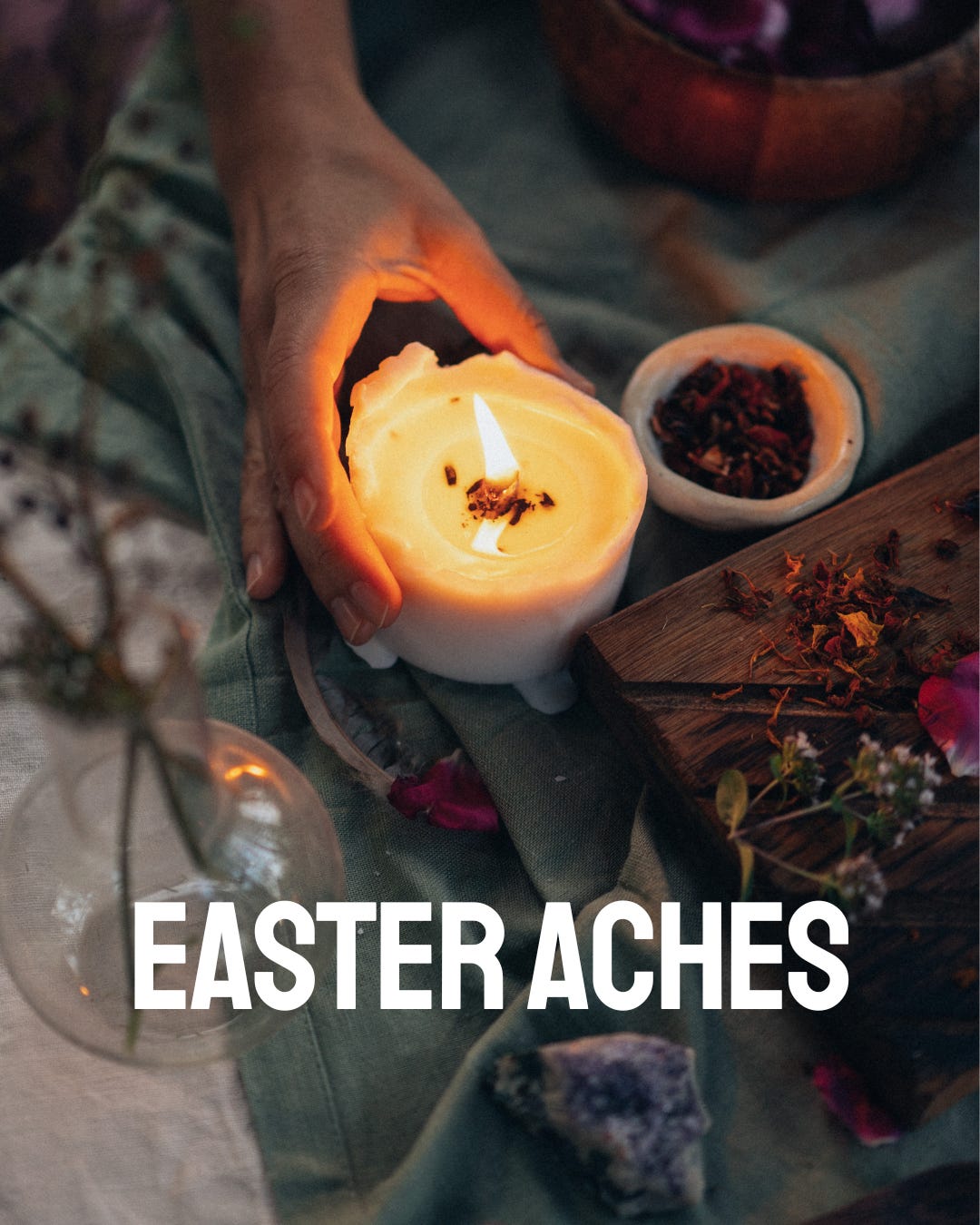This post is an excerpt from my eBook, The Sentimental Non-Believer (2022). It still holds. If you need to feel connected this Easter long weekend, Sam from Beyond the Surface and I chatted about tending to ourselves when feeling this particular ache. You can listen here.
“It’s Easter Sunday as I write this, and I have woken up realising the heaviness I often feel didn’t hit me this year. In the early days of leaving church, it was painful, and the grief was raw. Then as I started to feel less connected to the story itself, it felt awkward and unsettling, like I’d forgotten to be somewhere and wasn’t sure what to do with myself and my melancholy.
I always loved the Easter weekend. It felt like family, the pastors would throw eggs into the congregation and kids would be in the service, running around and dancing to the songs. The stage always looked so beautiful, and the creative team would prepare something special. I was always a weepy mess. There was a rhythm to it, Friday was reflective, Saturday we talked about the space we called the now-and-the-not-yet, Sunday we celebrated.
There’s something lovely about this time of year in Australia. The light is changing, daylight savings makes the days shorter, the oppressive heat of summer is giving way to cooler evenings. I start thinking about soup and baking bread.
Easter was such a tender time, I was deeply grateful and viscerally felt the enormity of Jesus' sacrifice for me, despite being innately sinful and damaged, it was unbelievable to me that I was loved so personally and unconditionally. That grace could be mine was a miracle. Having done the work, I now see a little girl who lost her dad and whose home life was lonely and volatile. She wanted to be part of something where she was seen and loved, where she belonged to a tradition. I still love a tradition.
I was transfixed by the Passion of the Christ movie when it came out. That image of Mary Magdalene at Jesus’ feet covered in dust moved me to the core. I thought of it every Easter after that and could place myself there, imagine myself as her wanting to touch his feet and be near him.
But as I gradually moved a little further away, I became sensitive to the violence of the cross and started to find the imagery distressing. Increasingly I needed beauty to fill me up and ground me. I couldn't relive that sort of trauma over and over and could only connect with resurrection Sunday when all was right with the world once more and it felt safer.
I was developing cognitive dissonance with the message that God had to kill his son, the ultimate blood sacrifice, because he loved us all so much. It started to become horrifying, and I couldn’t make it make sense or line up with the father God I had crafted in my imagination to replace my own.
For many years after leaving church the kids and I would go on Easter Sunday, not to the Mothership but to one of the campuses where we didn’t really know anyone. The tradition still felt powerful and rich, the evocative imagery, the music and ritual. Then a few years ago we stopped going. We didn’t really decide not to go, it sort of just happened. We began to talk more openly about what spirituality meant for each of us and they now have their own grown-up version of what it means to be a whole person.
There are elements of church and Christianity, at least the Western version, they have outright rejected, and other parts that still hold great tenderness. I have owned and apologised for my part in their experience of this particular brand of Christian identity being imposed upon them. I now love talking with them about ways of being spiritual and how we show up and find connection in the world.
I realised I valued rest and family and friends more than needing to be in church at Easter. I needed that time to lift my face to the Sydney autumn sun and just be. Still beloved and valued, not despite my sinfulness but because of my humanity. Innately worthy of love and belonging.
This year I made pumpkin fruit cake identical to the one my mum and much loved, stand-in father, Uncle George, made several times a year in batches. It was everywhere that cake, gifted at Christmas, piled up in the freezer, brought out on ornate trays for guests. It felt good to connect to a happy childhood memory.
I also made pan de yucas, a South American staple. They’re little balls of ricotta and cassava flour baked till they’re stretchy. Ideally you dip them in hot chocolate with chunks of mozzarella. I roll them in butter and flaky salt when they’re just out of the oven. My mother-in-law taught me to make them more than 20 years ago and the tactile mixing and rolling calms me. My kids love them.
I meditated, walked in the bush and spent time with friends. I chatted on the phone with another, and we talked about telling the truth in relationships and how transformative that is. We each said how grateful we were to be known and loved so well by the other. My partner sanded and painted an old table for me to use as an office desk. My son made me laugh.
The melancholy comes and goes now, and I can sort of just observe it. I can have compassion for the person I was and seek out connection and joy in new rhythms. When I feel it rising in me, I have learnt to bring myself back to the present moment and remind myself that I am enough”.




